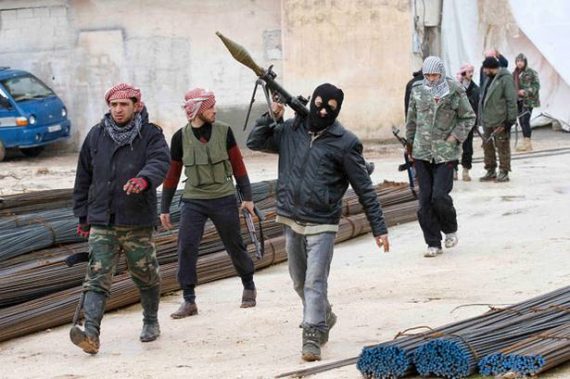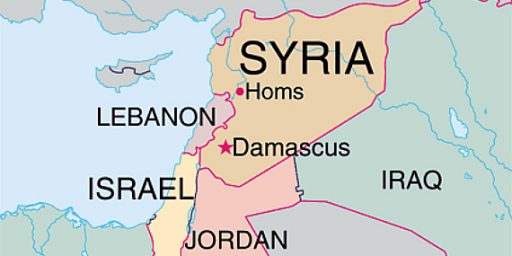Arming The Syrian Rebels Not Likely To Accomplish Anything
Arming the Syrian rebels may do nothing more than prolong a seemingly endless war, and pull the United States into a conflict it shouldn't be involved in.
With the Obama Administration now formally reconsidering its previous opposition to the idea of arming the Syrian rebels, Spencer Ackerman warns that taking that step isn’t necessarily going to guarantee that the Assad regime is going to fall:
As the Obama administration debates belatedly arming the Syrian opposition, military analysts are arriving at an uncomfortable conclusion: the U.S. can’t hand the rebels guns or rockets and expect them to topple dictator Bashar Assad. In fact, it may never happen.
Yes, the U.S. can provide lots of hardware, from shoulder-fired anti-aircraft missiles to communications systems to armored vehicles. That military gear can prolong the conflict, preventing dictator Bashar Assad from crushing the rebels. It is unlikely to tip the balance of the war toward the rebels so they can decisively overthrow Assad.
Obama is considering a range of weaponry to the rebels, as described in the Washington Post, including surface-to-air missiles. The idea would be to ship them the weapons, bolster their war effort, and watch them topple the blood-soaked dictator — without a deeper U.S. military commitment.
Except that few strategists consider that realistic. Assad has a variety of advantages — an adaptive military estimated at over 50,000; complete air superiority; chemical weapons — that he will retain even if Obama opens a new arms pipeline. Overcoming those advantages means getting, at the least, U.S. and allied airpower involved — a step the Obama administration, and especially the military, want to avoid. Especially since it might involve shooting down Iranian planes, a fateful step.
“The Syrian regime is not collapsing, nor is it on the verge of collapse,” says Christopher Harmer, a former U.S. Navy officer and analyst with the Institute for the Study of War. “Everyone has been saying that for about 18 months. It has contracted, and may be forced to contract further; as long as they have control of their chemical weapons, I don’t think there is a collapse scenario.”
(…)
All of this ignores fundamental issues like who governs a post-Assad Syria or how to keep U.S. military aid for the Syrian rebels out of the hands of the faction of fighters aligned with al-Qaida. But it illustrates two things. First, there isn’t a magic menu of weapons Obama can give that will lead to a rebel victory; missiles, radios and trucks can draw the conflict out longer but not end it on favorable terms. Second, even a move as seemingly low-cost as arming the rebels risks escalating into a commitment the U.S. can find it hard to end. Obama should have thought about that before he started talking about red lines.
Ackerman’s points are all well-taken. The conflict in Syria is far different from the conflict in Libya, where an allied coalition intervention in March led to the collapse of the Gaddafi regime by August. Not only is the Syrian military larger, it’s also better organized, better trained, and better equipped. Additionally, whereas the Libyan military was largely made up of mercenaries from the countries south, the Syrian military, especially at the command level, is made up primarily of the Alawaites who are tremendously loyal to the Assad regime. Add into that the fact that, unlike the Libyans, the Syrians are continuing to get resupplied by the Iranians and the Russians and it becomes eminently clear that that handing over arms to the Syrian rebels isn’t likely to lead to the collapse of the Assad regime. As Ackerman readily grants, it may mean that the Syrian state will contract even further than it already has (the government has effectively ceded control of the Kurdish areas of the country according to most reports). Unless his core supporters abandon him, though, Assad is likely to survive. Indeed, the fact that he’s managed to survive for more than two years now while leaders from Tunisia, Libya, Egypt, and Yemen have been deposed stands as strong evidence that getting rid of Bashar Assad is not an easy task at all. So, arming the Syrian rebels is just as likely to prolong the conflict as it is to hasten its conclusion.
This reality leaves us with a question that ought to be asked before we get further involved in the Syrian conflict. Let’s say we go ahead with arming the Syrian rebels and things turn out roughly the way that Ackerman is predicting in the piece quoted above. What is our next step? Do you send more powerful arms? Or, do we get more directly involved ourselves by setting up a no-fly zone, thus risking the possibility of putting American forces and American interests in the cross hairs of Syria’s allies in Hezbollah and Iran? These are the questions that the nation ought to be debating before the President makes what now seems the inevitable decision to arm rebels whom we can’t even say that we can trust at this point. Sadly, though, this nation has a long history of not asking the right questions before getting involved in messes like this.






Of course it will accomplish something. There will be more arms in the Middle East with practically no control over who gets them or what they do with them.
Ah, small intractable problems. Ackerman is likely more right than wrong and that is also something that the Pentagon and State Dept also realizes. Arm the rebels and if Assad is overthrown, the resulting state is likely dominated by Islamists or the killing continues. Do nothing and the killing continues.
How long before we begin hearing calls for a Rumsfeldian solution? Make this small problem large and attack Iran.
I believe I’ve read this somewhere before.
If we send military advisers, than the Viet Co … er … Syrian government will fall within the next six months.
The arguments here could have been applied to Libya.
Hell, I’ll go further: the arguments here should have been applied to Libya. What is the net gain in helping to topple a government that hates us, only to replace it with another government that hates us? Why would we trade one oppressive regime for another?
Two sets of bad guys are killing each other. We shouldn’t send arms, we should send out for pizza and popcorn.
Good on you General Odiniero for standing up for your staff and troops. You are a prime example to Pres Obama as to how he should stand up for his supporters and all America against a do-nothing GOP congress and their radicals in congress and the senate.
I guess people here are allergic to the idea of even considering any option in the Syria conflict, because saying you’ll consider any option is the same as comitting to a rerun of Vietnam/Iraq.
Well, lighten up, Francises.What the Administration did was say, for the first time, it’s officially considering arming the rebels. Now, do you think it hasn’t considered arming rebels before? Of course it has. So why is the Obama Administration making this announcement now?
I’ll tell you what I think. The announcement comes in the wake of evidence that Syria has used chemical weapons on a small scale. One way of stopping Syria from going further down that path is to issue a veiled warning that the USA might take action.
If yoou think of Middle East diplomacy as a chess game , what the Obama Admistration just did is to pick up a pawn. Its signalling that it saw what the Assad regime did, and that it’s considering a move, which might be advancing that pawn but might be another move altogether.
I’m sure that the Obama foreign policy team understands all the possible downsides of getting deeply involved in Syria. Unlike the Bush team, they’re not fools. But they understand that doing nothing isn’t in the national interest either, so they are sending a signal.This might be frustrating to those who like their foreign policy in shades of absolute black and white, with everything out in the open and telegraphed in advance, but in real life its dumb to run run foreign policy that way. In FP as in chess you often have to be subtle.
The problem with picking up a pawn is that eventually you have to move it.
@JWH:
Actually, no. You can leave it right where it is and move other pieces:-).
@stonetools:
http://en.wikipedia.org/wiki/Touch-move_rule
Give arms to who? I doubt they know who’s who and who belongs to what organization! I think it would be big mistake. They have enough lunatics running around with weapons now much like here! Yet they want to arm more just like here! We need to stay out of it as sad as it is.
Unlikely to accomplish anything good, anyway. [bah, Dave Schuler beat me to it]
This is a bad idea. Less bad than invading, don’t get me wrong, but still bad (partly because it might lead to invading).
Now this could be part of the Administration’s attempt to deal with the box O put himself in with the “red line” comments.
Stonetools: you are correct I’m “allergic” to getting involved in yet another civil war in someone else’s country. Particularly in the ME. Crazy, I know.
If there’s anything I know, it’s that having everybody armed is safer for everyone.
The chances of an American invasion of Syria are nil. The most you might have to worry about would be a no fly zone, that is conceivable, but an invasion? Unimaginable. The American public would never countenance it, the President is too smart a politician to even consider it.
@Rob in CT:
We’re already involved ( with humanitarian aid) and , realistically, we’re going to be involved , so long as Syria borders on Israel ( which is going to be forever). We may not like it, but there are a hell of a lot people in the US who care about Israel and who are going to be concerned if Syria implodes in a way that endangers Israel. You can tap dance all you want about how Israel “shouldn’t matter” but there it is.
Also too, Turkey, a NATO ally, borders Syria. Turmoil in Syria endangers democracy in Turkey, where there is a fragile balance between secularists and Islamists. Syria is like Afghanistan. Syria isn’t important, but it borders on important countries. Is it in the US national interest to keep Turkey and Israel stable? Well, hell yes, and you do that by trying to restore order in Syria.
All of this doesn’t mean we should invade Syria, but that isn’t the ONLY option right now, despite doomsday talk of inevitable slippery slopes. As I’ve said, we should be encouraging secularists. We can do that, without sending in the 101st Airborne. Really, we can.
Now should we? I’m willing to let the Obama Administration consider the issue, without having an attack of the vapors about the very remote possibility of a US ground invasion.
@stonetoolswrop:
Baathists are secularists. The Alawite? Drink, smoke, wear suits, real serious arguments that they aren’t actually Muslims. Christians….well…wink wink nudge nudge say no more. Druze? How radical can that stuff be? They don’t even let people know who they are, for the most part. Well-to-do Sunni who have cast their lot with all the above? They qualify, I thinks.
What should we do to encourage these folks?